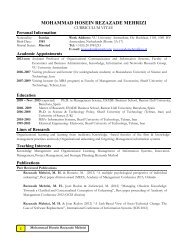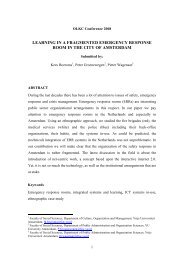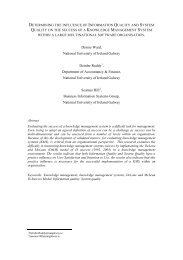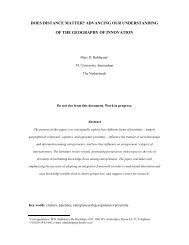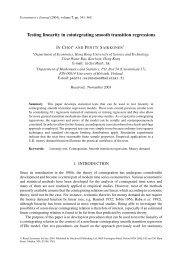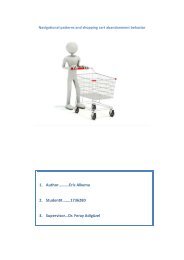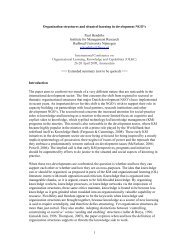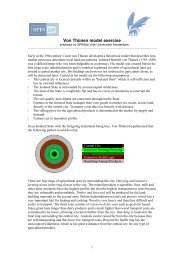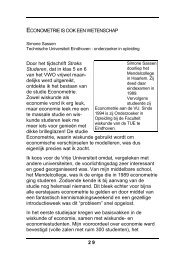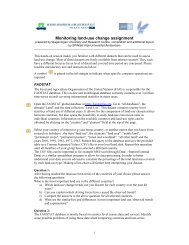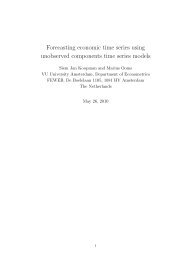The effects of road pricing - Feweb - Vrije Universiteit Amsterdam
The effects of road pricing - Feweb - Vrije Universiteit Amsterdam
The effects of road pricing - Feweb - Vrije Universiteit Amsterdam
Create successful ePaper yourself
Turn your PDF publications into a flip-book with our unique Google optimized e-Paper software.
psychology discipline, possibly indicating (in)consistencies. Chapter 4 presents the<br />
empirical findings <strong>of</strong> an extensive survey conducted among Dutch commuters who<br />
regularly experience congestion. <strong>The</strong> respondents faced a choice experiment in which<br />
they distributed 10 trips over 4 constructed alternatives. <strong>The</strong> estimated choice models<br />
provide information on the behavioural responses <strong>of</strong> the commuters in terms <strong>of</strong><br />
departure time, route choice and mode choice when confronted with <strong>road</strong> <strong>pricing</strong>.<br />
Moreover, we derive estimates for important transport policy concepts such as the value<br />
<strong>of</strong> time, value <strong>of</strong> schedule delay (early and late), and the value <strong>of</strong> uncertainty. This<br />
analysis focuses on the short-term responses <strong>of</strong> commuting traffic to <strong>road</strong> <strong>pricing</strong>.<br />
Chapter 5 presents the results from another survey with a different sample (car owners in<br />
general). It analyses the short-term responses <strong>of</strong> the respondents, but also includes the<br />
more long-term decision <strong>of</strong> car ownership. <strong>The</strong> data have been collected by a second<br />
questionnaire in which the respondents evaluated three different types <strong>of</strong> kilometre<br />
charges with varying use <strong>of</strong> revenues 1 .<br />
In Part II, two (out <strong>of</strong> many) important institutional aspects <strong>of</strong> transport <strong>pricing</strong> are<br />
considered. <strong>The</strong> first concerns <strong>pricing</strong> by private versus public operators (Chapter 6).<br />
This question is not only relevant for the foreseen privatisation <strong>of</strong> public transport<br />
systems, but may also soon become relevant for <strong>road</strong> transport, given the increasing<br />
interest in privately-operated pay-lanes or highways. <strong>The</strong> second aspect concerns the<br />
question <strong>of</strong> the level <strong>of</strong> government at which transport prices would be set (Chapter 7).<br />
Urban, regional, national, and transnational governments may frequently pursue<br />
different goals and would therefore <strong>of</strong>ten set different prices. Likewise, the use <strong>of</strong><br />
revenues may be strongly dependent on the level <strong>of</strong> government at which prices are set.<br />
Part III <strong>of</strong> the main analysis deals with acceptance issues <strong>of</strong> new <strong>road</strong> <strong>pricing</strong> measures.<br />
Economic theory has demonstrated (see Chapter 2) that the current <strong>pricing</strong> regimes are<br />
<strong>of</strong>ten not very efficient, and that there is scope for other types <strong>of</strong> measures. <strong>The</strong>se more<br />
efficient measures have so far only seldom been implemented in practice. <strong>The</strong> low level<br />
<strong>of</strong> implementation is nowadays not so much caused by technical or administrative<br />
problems. Rather, the problem is that it is generally acknowledged that <strong>pricing</strong> measures<br />
meet public resistance and that acceptability is one <strong>of</strong> the major barriers to the successful<br />
implementation <strong>of</strong> new and more efficient <strong>pricing</strong> measures. Chapter 8 investigates the<br />
barriers to <strong>road</strong> <strong>pricing</strong> by means <strong>of</strong> a literature review. Explicit attention is paid to the<br />
role <strong>of</strong> revenue use. <strong>The</strong> spending <strong>of</strong> the revenues from <strong>road</strong> <strong>pricing</strong> may have<br />
considerable consequences not only in terms <strong>of</strong> public acceptance but also for the<br />
overall efficiency <strong>of</strong> the scheme. <strong>The</strong> results <strong>of</strong> this survey on the empirical and<br />
theoretical work available on this topic are then used as input for the design <strong>of</strong> both<br />
questionnaires described in Part I. <strong>The</strong> questionnaires distributed to commuters and<br />
households do not only focus on behavioural responses, but also address the issue <strong>of</strong><br />
acceptability and revenue use. Chapter 9 presents the empirical results <strong>of</strong> the survey that<br />
was carried out. <strong>The</strong> aim is to identify important explanatory variables for the level <strong>of</strong><br />
acceptance for different types <strong>of</strong> <strong>road</strong> <strong>pricing</strong> measures, and to score different types <strong>of</strong><br />
revenue use in terms <strong>of</strong> acceptance.<br />
Finally, Chapter 10 brings all the results together. It provides a synthesis <strong>of</strong> the<br />
theoretical and empirical findings, puts them into a policy perspective, and indicates<br />
which directions are most promising for further research.<br />
1 <strong>The</strong> empirical part <strong>of</strong> this thesis analyses different types <strong>of</strong> <strong>road</strong> <strong>pricing</strong> measures. In most cases we have<br />
specified both the type <strong>of</strong> price measure and the type <strong>of</strong> revenue allocation. One <strong>of</strong> the measures includes<br />
variabilisation. This measure, policy relevant in the Netherlands, refers to the implementation <strong>of</strong> a<br />
kilometer charge together with the abolition <strong>of</strong> car taxation independent <strong>of</strong> car use (car ownership taxation<br />
and car purchase taxation).<br />
6



